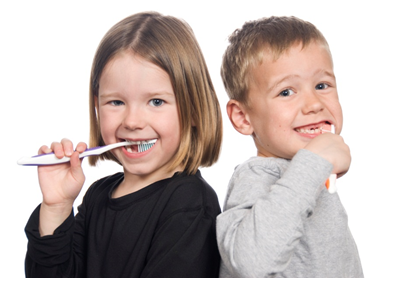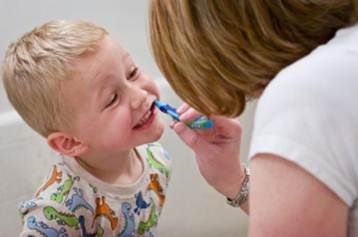“It’s very difficult to guide the habit of dental care of
children in all ages. To celebrate Dental Health Month, we will give you some
useful information about teeth care for children.”

It’s very
difficult to guide the habit of dental care of children in all ages.
Michelle was stunned to tell her valuable experience when
going with 4-year-old Avery to the dentist. The mother with 3 children was
totally shocked when the dentist roared angrily and asked her what she did/or
didn’t do in the process of dental care for her daughter. “The dentist said my
daughter’s teeth were the worst teeth he had ever seen and Avery might have to
make a dental surgery.” The doctor quickly did filling and soldering for her.
After listening to lessons on oral health, Michelle promised look after her
children’s teeth more carefully. “Actually what they taught is similar to what
I have known and I used to take care of Avery’s teeth such as brushing her
teeth 2 times per day, encouraging her to eat carrots and apples and limit to
eating snacking food”. The problem is how to completely restrict dental caries
and control this habit?
These stories like Avery are becoming popular. In fact, more
and more children have tooth decay since the kindergarten age. A study from US
Center of Disease Control and Prevention in 2004 revealed that “Early Childhood
Caries” (ECC) symptom – the term indicates the process which the enamel is
broken, leading to tooth decay – is the common situation of ¼ of North American
children from 2 – 5 years old. According to surveys, the rate of EEC children
in this age increased 4% over the same period last year. The report in July,
2008 of Alberta College emphasized that ECC was becoming a public disease that
affected seriously to children.
Dental issues of children
Many parents don’t care about ECC till it recrudesces.
Honestly, issues about teeth need looking after more carefully because teeth
play an important role in digestion and forming permanent teeth process.
“Whenever children have tooth decay as being little, they will have a high risk
of tooth decay in adulthood” – according to Rosamund Harrison, dental surgeon
and director of Pediatric Teeth Association.
In recent years, teeth problem of children has changed a
lot, especially the rate of 6 – 11-year-old children has at least a decayed
tooth has decreased dramatically, from 74% in 1972 to 25% in 2009. Factors
contributing to this positive change are the professional dental care mode to
the community and the movement to use toothpaste and mouthwash containing
flour. However, the side effect of this program opens a side effect for dental
disease – acute tooth caries – a complex disease which ask patients for
long-term treatment with many periods and more than normal care as brushing,
flossing and visiting the doctor per 6 months.
“Dental care is a long process because there is no morning
you wake up without facing the risk of tooth caries. In addition, ECC is not
only a dental problem. It is also a connection with the habit of family and
community affecting to children. ECC is a disease coming from a variety of
factors” – Dr. Harrison concluded.

Dental issues of
children
Factors impacting on ECC
Genetics play a large part in ECC. If parents have cavities,
their children will have a high risk of generic decay tooth. Besides that,
enamel of milk-tooth is often soft and easy to be corroded by acid while
bacteria or sweet decomposes in the mouth. Additional examples demonstrating
the impact of genetics is the diet of the family, habit of dental care and
habit of using flour products.
Jennifer Pinarski believed that she was the cause tooth
decay for her children. As far she was concerned, because her family moved from
Winnipeg to Bobcaygeon where they didn’t find water containing flour for dental
care, both her sons were diagnosed with tooth caries later.
Water containing flour is usually limited in some areas in
Canada. In case you can’t access to that kind of water, use normal water and
combine with toothpaste containing flour – specialized toothpaste helping
protect tooth enamel and prevent tooth decay. By this way, you can strengthen
tooth from the inside.
Toothpaste usually contains flour for children over 3 years
old to ensure safety. However, Canadian Dental Association (CDA) recommends
that toothpaste containing flour is also used for children under 3 years old
who have a high risk of ECC. Dentists often assess the risk of ECC at the first
examination and during 1 year old. In addition, Dr. Harrison and some dentists
share that some flour supplement medicines (liquid or gel) are often not highly
effective as expected and they are not necessary to be used, especially flour
mouthwash is just suitable for children who are over 6 years old and have
serious tooth caries.
Please notice that brushing for kids 2 times every day is
insufficient. Parents need to observe habits and behaviors of children such as
what kind of foods they usually eat, what category of beverages they drink and
then suggest proper solution.